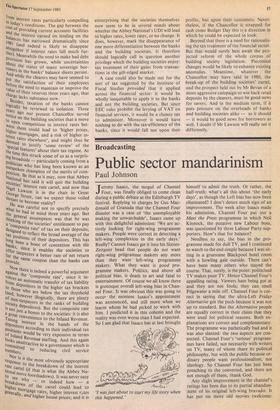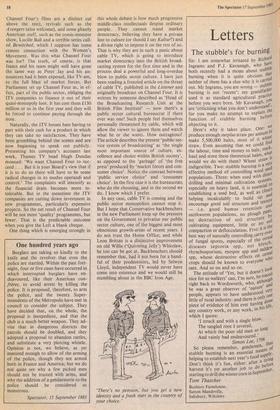Broadcasting
Public sector mandarinism
Paul Johnson
Jeremy Isaacs, the mogul of Channel Four, was finally obliged to come clean during a public debate at the Edinburgh TV festival. Replying to charges by Gus Mac- donald of Granada that the Channel Four disaster was a case of 'the unemployable making the unwatchable', Isaacs came up with this delightful admission: `We are ac- tively looking for right-wing programme makers. People were correct in detecting a left-wing complexion in the early days.' Really? Cannot Isaacs get it into his Sixties- Zeitgeist head that people do not want right-wing prOgramme makers any more than they want left-wing programme makers. What they want is good pro- gramme makers. Politics, and above all political bias, is death to art and fatal to entertainment. Of course we all know there is grotesque overall left-wing bias in Chan- nel Four. It was obvious this was going to occur the moment Isaacs's appointment was announced, and still more when we learnt whom he had picked to work with him. I predicted it in this column and the reality was even worse than I had expected. So I am glad that Isaacs has at last brought
'I was just about to start my life story when this happened.' himself to admit the truth. Or rather, the half-truth: what's all this about 'the early days', as though the Left bias has now been eliminated? I don't detect much sign of an improvement. The week after Isaacs made his admission, Channel Four put out a Meet the Press programme in which Neil Kinnock, the putative new Labour boss, was questioned by three Labour Party sup- porters. How's that for balance?
Needless to say, the bias in the pro- gramme made for dull TV, and I continued to watch to the end simply because I was sit- ting in a gruesome Blackpool hotel room with a howling gale outside. There can't have been many others who stayed the course. That, surely, is the point: politicised TV makes poor TV. Hence Channel Four's appalling rating. Viewers hate being got at and they are not fools; they can smell Pilgewater a mile off. Channel Four is cor- rect in saying that the ultra-Left Friday Alternative got the push because it was not up to standard. But the Alternative people are equally correct in their claim that they were axed for political reasons. Both ex- planations are correct and complementary. The programme was pathetically bad and it was also slanted: the two aspects are con- nected. Channel Four's 'serious' program- mes have failed, not necesarily with writers on TV, many of whom share its political philosophy, but with the public because or- dinary people want professionalism, not ideology. So Channel Four has just been preaching to the converted, and there are not enough of them, thank God.
Any slight improvement in the channel's ratings has been due to its partial abandon- ment of its original left-wing bravado. It has put on more old movies (welcome; Channel Four's films are a distinct cut above the rest), revivals such as the A vengers (also welcome), and some ghastly American stuff, such as the comic-monster show, Lucille Ball and a terrible series call- ed Bewitched, which I suppose has some remote connection with the Women's Movement. Was this what Channel Four was for? The truth, of course, is that Isaacs and his team might well have gone the same way as Peter Jay and his an- nouncers had it been exposed, like TV-am, to the full blast of market forces. But Parliament set up Channel Four as, in ef- fect, part of the public sector, obliging the ITV companies to finance it out of their quasi-monopoly loot. It has cost them £130 million or so in the first year and they will be forced to continue paying through the nose.
Naturally, the ITV bosses hate having to part with their cash for a product in which they can take no satisfaction. They have been grumbling behind the scenes and are now beginning to speak out publicly. Presenting his company's accounts last week, Thames TV head Hugh Dundas moaned: 'We want Channel Four to suc- ceed . . . But it is your Board's view that if it is to do so there will have to be some radical changes in its modus operandi and control.' The complaints will intensify as the financial drain becomes more in- tolerable. But in the meantime the ITV companies are cutting down investment in new programmes, particularly expensive projects. So the net result of Channel Four will be not more 'quality' programmes, but fewer. That is the predictable outcome when you give the Left a blank cheque.
One thing which is emerging strongly in this whole debate is how much progressive middle-class intellectuals despise ordinary people. They cannot stand market democracy, believing they have a private line to culture (or should I say Kultur?) and a divine right to impose it on the rest of us. That is why they are in such a panic about cable TV, which is going to introduce market democracy into the British broad- casting system for the first time and in the process deal a powerful and long-overdue blow to public sector culture. I have just been reading a frenzied article on the threat of cable TV, published in the Listener and originally broadcast on Channel Four. It is written by someone described as 'Head of the Broadcasting Research Unit at the British Film Institute' — now there's a public sector cultural bureaucrat if there ever was one! Such people feel themselves personally threatened by cable, which will allow the viewer to ignore them and watch what he or she wants. How outrageous! The article describes the present 'public ser- vice system of broadcasting' as 'the single most important source of culture, ex- cellence and choice within British society', as opposed to the 'garbage' of 'the free press' produced by 'market forces and con- sumer choice'. Notice the contrast between 'public service choice' and 'consumer choice'. In the first case it is the bureaucrats who do the choosing, and in the second we do. I 'know which I prefer.
In any case, cable TV is coming and the public sector monopolists cannot stop it. But I hope that Conservative backbenchers in the new Parliament keep up the pressure on the Government to privatise our public sector culture, one of the biggest and most obnoxious growth-areas of recent years. I do not trust the Home Office; and while Leon Brittan is a distinctive improvement on old Willie ('Quivering Jelly') Whitelaw, he too can be got at. Backbenchers should remember that, had it not been for a hand- ful of their predecessors, led by Selwyn Lloyd, independent TV would never have come into existence and we would still be stumbling about in the BBC Iron Age.
'There's no pension, but you get a new identity and a fresh start in the country of your choice.'







































 Previous page
Previous page